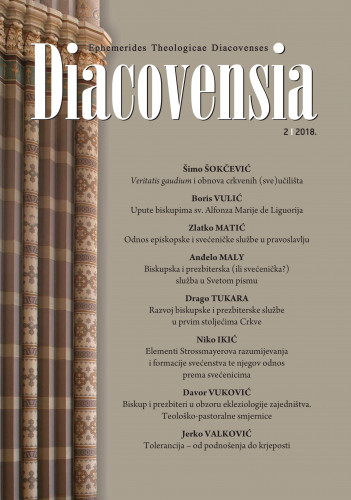Svoje razmišljanje o biskupskoj i prezbiterskoj službi u Svetom pismu autor započinje razlaganjem o terminološkoj distinkciji pojmova prezbitera, biskupa i svećenika. Prema svetopisamskim tekstovima one su pojmovno udaljenije od onoga što suvremeni čovjek misli kada govori o tim službama ili, bolje rečeno, osobama. Iz detaljne terminološke analize proizlazi kako u Svetom pismu postoji razlika između riječi prezbiter i svećenik. Na temelju dobivenih rezultata, prva bi označavala osobu koja se brine za profano, dok bi se druga odnosila na osobu koja se brine za svete stvari. Biskup je, s druge strane, osoba koja nadgleda zajednicu. Na temelju biblijskih tekstova autor u drugome dijelu rada iznosi svjedočanstva o utemeljenju i razvoju svećeničke, prezbiterske i biskupske službe pokušavajući obrazložiti prethodno utemeljenu terminološku razliku, kao i uočljivu promjenu situacije u novozavjetno vrijeme. Činjenica koja je stalna jest da su službe svećenika, prezbitera i biskupa funkcionalno i pojmovno, barem prema onomu što donose tekstovi Svetoga pisma, postavile temelje za daljnja razmišljanja i teološka utemeljenja tih službi.; It is quite difficult to speak about bishops and presbyters and their ministries in the Holy Scripture since biblical terminology explains their functions quite differently than they are known today. According to this, the author primarily emphasizes the terminology and some scriptural evidences of ministries in question. The author explains words such as presbyter, bishop (episkopos) and priest, showing first how the biblical word for presbyter (=elder) diverges from the biblical word priest (kōhēn; hiereus). Similarly, the biblical word episkopos (bishop) does not have the same modern meaning as it has today, where it means the third order of ordained minister, while in the Bible it means a supervisor or a protector of the community. It is possible to say, the author concludes, that the offices of bishop (episkopos) and presbyter (=elder) should be considered in the sense of duty, while the priest (kōhēn; hiereus) deals with sacred things. Furthermore, basing the evidence on biblical texts, the author gives some clarification about the development of the offices of priests, presbyters, and bishops, both in the Old and in the New Testament. The scriptural data reveals that these offices have emerged and evolved in response to a variety of needs and leadership in the community. In conclusion, the author asserts that it is quite difficult to establish a clear terminological and functional link between biblical terms and duties of priests-presbyters-bishops and their actual offices. At least, according to the Scripture, it could be said that a priest, priest-presbyter, or a bishop-presbyter should be considered as offices that tend more to sacred and spiritual things rather than temporal things. Their ministries (as known today) are mostly linked with successive theological reflections, when they became more ordered, uniformed, and regulated.
Sažetak

 Diacovensia : teološki prilozi : 26,2(2018) / glavni i odgovorni urednik, editor-in-chief Šimo Šokčević.
Diacovensia : teološki prilozi : 26,2(2018) / glavni i odgovorni urednik, editor-in-chief Šimo Šokčević.